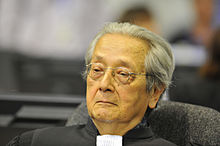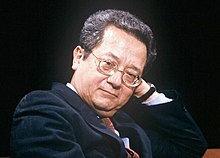Jacques Vergès
Jacques Vergès (* probably April 20, 1924 in Laos , officially March 5, 1925 in Ubon , Siam , † August 15, 2013 in Paris ) was a French lawyer . He became known as a defense lawyer for dictators, rebel leaders and Nazi and war criminals .
Life
Jacques Vergès was born the son of the Vietnamese school teacher Pham Thi Khang and the French doctor Raymond Vergès. Officially, his date of birth, like that of his brother Paul Vergès , was given as March 5, 1925, when the father was consul in Ubon Ratchathani. In fact, he was almost a year older. After their mother's death, both boys grew up in their father's homeland, the island of Réunion in the Indian Ocean. At the Lycée in Saint-Dénis he was a classmate of the future Prime Minister Raymond Barre .
In 1942 Jacques Vergès joined the France Libre movement under Charles de Gaulle and fought in North Africa, Italy and France . After the Second World War he served as an occupying soldier in Baden and in the Westerwald . He then studied law and history at the Sorbonne , but also Hindi and Malagasy at the Institut national des langues et civilizations orientales (Langues O). At the same time, he began to be politically active, joined the French Communist Party , and was initially involved in the decolonization of Southeast Asia (here he also met Hồ Chí Minh and the later Cambodian dictator Pol Pot ). As secretary of the International Union of Students (IUS) he lived in Prague from 1952 to 1954 , where he made the acquaintance of Erich Honecker and the later KGB boss Alexander Schelepin . Returned to Paris, he completed his law degree. Vergès took his oath as a lawyer in 1955 and became the first secretary of the Conférence des avocats du barreau de Paris .
In 1957 Vergès left the PCF because he found the party's position on the Algerian question too half-hearted. During the Algerian War , Vergès defended a number of Algerian fighters from the National Liberation Front (FLN). Among them was Djamila Bouhired , who was sentenced to death and later pardoned, and whom he later married. After Algeria's independence in 1962, he headed the African Relations Department at the Algerian Foreign Ministry and, with Bouhired, published the magazine Révolution africaine . He took Algerian citizenship, converted to Islam, and took the first name Mansour. Due to the Sino-Soviet conflict, however, he fell out with the Algerian President Ahmed Ben Bella (who leaned towards Moscow, while Vergès was Beijing) and had to leave Algeria again. With Djamila Bouhired he had two daughters.
In 1970 he left his family and did not reappear until 1978. Until his death he refused to give any information about this time, which he called his “big vacation”. Various biographers and contemporary witnesses have had different theories about his whereabouts. Due to his legal work, he had contacts with various underground political organizations in Asia, North Africa and the Middle East, which is why there is a presumption that he joined one of these groups. Employees of the French secret service and his French friends believe Cambodia is the place for his long break. They believe that the lawyer was at least most of the time in the Far Eastern jungle with the Khmer Rouge . Others suspect that Vergès worked for various secret services, possibly even as a double agent. In his award-winning Vergès documentary L'avocat de la terreur, Barbet Schroeder , regardless of his whereabouts at the time, put forward the thesis that he had fled his creditors because of massive financial problems.
Vergès died of a heart attack at the age of 88 .
Legal activity

From the end of the 1970s, Vergès increasingly appeared as a lawyer. He specialized in the defense of prominent and often very controversial people. His clients included the Gestapo officer Klaus Barbie , the Serbian President Slobodan Milošević , the Holocaust denier Roger Garaudy , the former President of Mali , Moussa Traoré , the terrorist Ilich Ramírez Sánchez (known as Carlos ) and his wife Magdalena Kopp as well as the former Dictator of Togo , Gnassingbé Eyadéma .
The tabloid press gave him the nickname “the devil's lawyer” because of these clients . The French film director Barbet Schroeder shot a documentary about the life of Vergès in 2006 with the title L'Avocat de la Terreur (German DVD title "On behalf of terror"), which u. a. at the 2007 Cannes Film Festival . The film was awarded the César in Paris in 2008 and was broadcast by arte on October 13, 2010 under the title The Lawyer of Terror .
In the trials before the Khmer Rouge Tribunal against leading Khmer Rouge , he took over the defense of Khieu Samphan , with whom he had been well acquainted for over 55 years. Vergès dared to predict that this process in particular would fail in advance . He believed that Khieu Samphan was innocent because there was no genocide in Cambodia.
Quote
- At Barbie's 1987 trial in Lyon, I faced 39 opposing lawyers and the judge all by myself. That was reason enough to take on Barbie's defense.
literature
- Erich Follath: The children of the Killing Fields. Cambodia's path from a terror country to a tourist paradise . Deutsche Verlags-Anstalt et al., Stuttgart et al. 2009, ISBN 978-3-421-04387-0 .
- Interview . In: Der Spiegel , vol. 62 (2008), issue 47 from November 17, 2008, ISSN 0038-7452 .
- Autobiography: Le Salaud lumineux (various editions, among others as paperback 1990, Lafon Edition N ° 1, ISBN 978-2863914083 ) The title is translated as follows: The brilliant scoundrel
Web links
- Literature by and about Jacques Vergès in the catalog of the German National Library
- Jacques Vergès in the Internet Movie Database (English)
- A man of impossible trials - Report on Vergès in Stern magazine on March 30, 2004
- Portrait of Alan Riding: A Life of Smoke and Mystery , New York Times, October 14, 2007
Individual evidence
- ↑ a b Alexander Smoltczyk: The master and the monsters. In: Der Spiegel , September 2, 2002.
- ↑ a b Mort de Jacques Vergès, avocat brillant, redouté et parfois haï. In: Le Monde , August 15, 2013.
- ↑ Biography Arte TV ( Memento of the original from January 21, 2016 in the Internet Archive ) Info: The archive link was inserted automatically and has not yet been checked. Please check the original and archive link according to the instructions and then remove this notice.
- ↑ Biography: Qui est Jacques Vergès? ( Memento of the original from November 26, 2008 in the Internet Archive ) Info: The archive link was inserted automatically and has not yet been checked. Please check the original and archive link according to the instructions and then remove this notice. (French)
- ↑ a b Jacques Vergès - With the Passion for the Hopeless , obituary of the Süddeutsche Zeitung of August 16, 2013, accessed August 17, 2013
- ↑ Hans-Helmut Kohl: The eternal provocateur. In: Frankfurter Rundschau , January 16, 2004.
- ↑ a b c Gilles Gaetner: Les mille et une vies de Me Vergès. In: L'Express , February 28, 2005.
- ↑ Jamila Aridj: Jacques Vergès, l'homme aux mille vies. In: Le Point , August 16, 2013.
- ↑ Defender of Saddam Hussein: Star lawyer Jacques Vergès died at spiegel.de, accessed on August 16, 2013
- ↑ Sascha Lehnartz: "Whoever lays bombs asks questions". In: Welt , August 17, 2013.
- ↑ Erich Follath : The children of the Killing Fields. Cambodia's path from a terror country to a tourist paradise . Deutsche Verlags-Anstalt u. a., Stuttgart a. a. 2009, ISBN 978-3-421-04387-0 .
- ↑ Interview, 10.2008, Erich Follath, p. 262 in The Children of Killing Fields. Cambodia's path from a terror country to a tourist paradise
- ↑ spiegel.de: Interview, November 2008
| personal data | |
|---|---|
| SURNAME | Vergès, Jacques |
| BRIEF DESCRIPTION | French lawyer and criminal defense attorney |
| DATE OF BIRTH | uncertain: April 20, 1924 |
| PLACE OF BIRTH | unsure: Laos |
| DATE OF DEATH | 15th August 2013 |
| Place of death | Paris |

